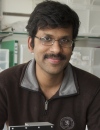Govind V Kaigala,
Research Staff Member,
IBM Research Laboratory-Zurich
Dr. Govind Kaigala is a Research Staff Member at the Laboratory of IBM in Zurich. He is currently leading activities on liquid-based non-contact scanning probe technologies – microfluidic probe – and is championing concepts on “open space” microfluidics and “tissue microprocessing”. These research activities are driven by specific needs in the fields of pathology and personalized medicine. He is passionate about translational clinical/medical research and strives to bring in quantitation in biology.
Previously, he was an NSERC postdoctoral fellow at the microfluidics laboratory in Mechanical Engineering and Urology at Stanford University, USA. Dr. Kaigala received his Ph.D (Electrical Engineering and Oncology) and M.Eng from the University of Alberta, Canada. Dr. Kaigala has authored and co-authored 52 scientific publications, 90 conference papers/abstracts, 1 book, and 35 patent families. In addition to IBM and other industrial entities, his work is supported by the European Research Council (ERC), the European Union and Swiss National Science Foundation. He is the recipient of several IBM recognitions, Research Division Accomplishment Award in 2014 & 2017, named as IBM “master inventor” in 2018, the Horizon Alumni Award from the University of Alberta, and he is a Senior Member of IEEE.
|

|
|

 Add to Calendar ▼2018-06-06 08:30:002018-06-06 09:30:00Europe/LondonTissue Microprocessing: Shaping Sub-nanoliter Volumes of Liquids on Tissue Sections for Multimodal AnalysisLab-on-a-Chip and Microfluidics Europe 2018 in Rotterdam, The NetherlandsRotterdam, The NetherlandsSELECTBIOenquiries@selectbiosciences.com
Add to Calendar ▼2018-06-06 08:30:002018-06-06 09:30:00Europe/LondonTissue Microprocessing: Shaping Sub-nanoliter Volumes of Liquids on Tissue Sections for Multimodal AnalysisLab-on-a-Chip and Microfluidics Europe 2018 in Rotterdam, The NetherlandsRotterdam, The NetherlandsSELECTBIOenquiries@selectbiosciences.com Add to Calendar ▼2018-06-05 00:00:002018-06-06 00:00:00Europe/LondonLab-on-a-Chip and Microfluidics Europe 2018Lab-on-a-Chip and Microfluidics Europe 2018 in Rotterdam, The NetherlandsRotterdam, The NetherlandsSELECTBIOenquiries@selectbiosciences.com
Add to Calendar ▼2018-06-05 00:00:002018-06-06 00:00:00Europe/LondonLab-on-a-Chip and Microfluidics Europe 2018Lab-on-a-Chip and Microfluidics Europe 2018 in Rotterdam, The NetherlandsRotterdam, The NetherlandsSELECTBIOenquiries@selectbiosciences.com